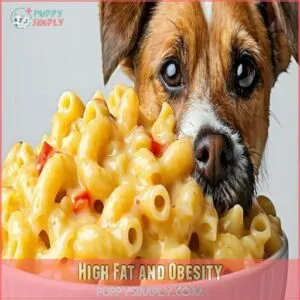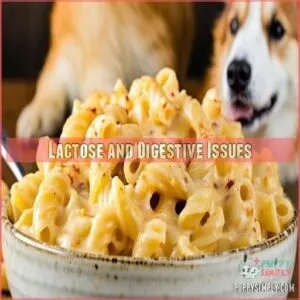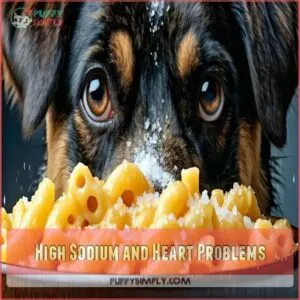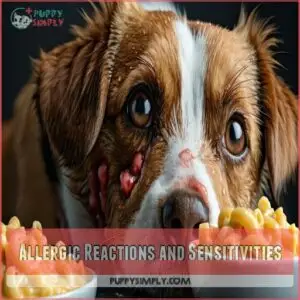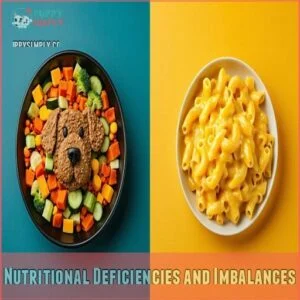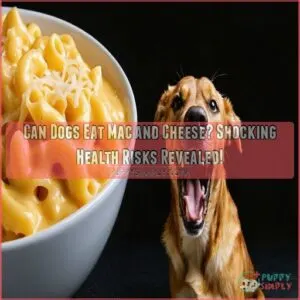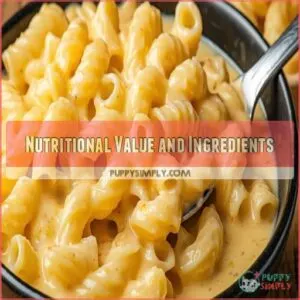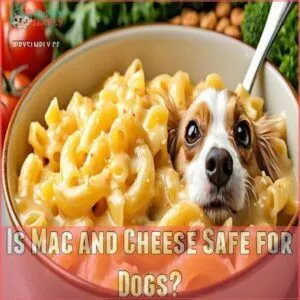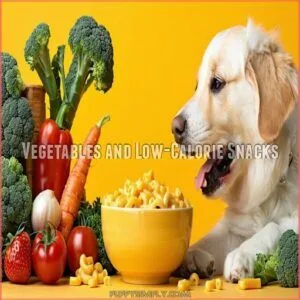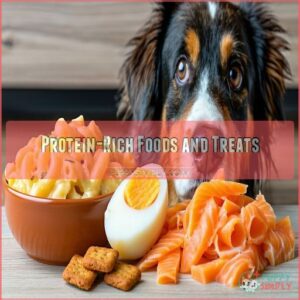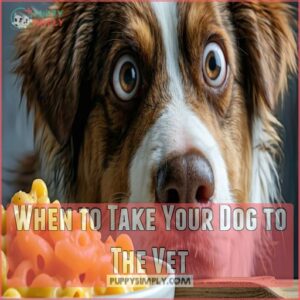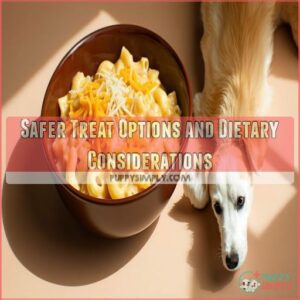This site is supported by our readers. We may earn a commission, at no cost to you, if you purchase through links.
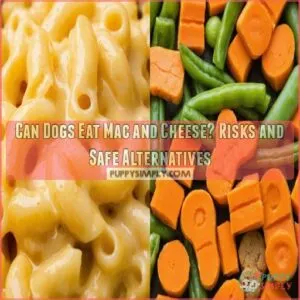
This cheesy delight might be your comfort food, but for dogs, it’s a ticket to tummy troubles. Loaded with fats, lactose, and sodium, mac and cheese can lead to digestive issues, obesity, and even heart problems. Some pooches might experience a bout of diarrhea or start guarding their dinner bowls fiercely.
Instead, think about healthier bites like sweet potatoes or crunchy carrots for your furry pal. They’re tasty and much safer!
Curious about other dog-friendly snacks that could make tails wag? There’s more to explore on canine cuisine!
Table Of Contents
- Key Takeaways
- Health Risks of Mac and Cheese for Dogs
- Can Dogs Eat Mac and Cheese?
- Nutritional Value and Ingredients
- Is Mac and Cheese Safe for Dogs?
- Healthier Alternatives to Mac and Cheese
- When to Take Your Dog to The Vet
- Safer Treat Options and Dietary Considerations
- Frequently Asked Questions (FAQs)
- Is it okay for dogs to eat mac and cheese?
- Can dogs eat cheese sauce?
- Can dogs have Kraft dinner?
- Can dogs have Velveeta?
- Is macaroni and cheese bad for all dogs?
- Are there any health benefits to feeding dogs macaroni and cheese?
- Is it safe to feed macaroni and cheese to puppies?
- Can a small amount of mac and cheese harm my dog?
- What cheese is safest for dogs in mac and cheese?
- Are there homemade mac and cheese recipes for dogs?
- Conclusion
Key Takeaways
- You shouldn’t feed your dog mac and cheese, as it contains high fats, lactose, and sodium that can cause obesity and digestive issues.
- Avoid the health risks of mac and cheese by offering healthier alternatives like sweet potatoes, carrots, or fruits.
- Be on the lookout for symptoms like vomiting or diarrhea if your dog sneaks some cheesy bites, and consult a vet if needed.
- Stick to dog-safe treats and balanced diets to ensure your furry friend’s health and well-being.
Health Risks of Mac and Cheese for Dogs
You might think sharing your mac and cheese with your dog is harmless, but it’s not as simple as letting them enjoy a cheesy treat.
Packed with high fats, lactose, sodium, and potential allergens, mac and cheese can lead to obesity, digestive issues, heart problems, and nutritional imbalances for your furry friend.
High Fat and Obesity
If Fido’s been eyeing your mac and cheese, it’s best to resist those puppy eyes.
Similar to cheeseburgers, which pose risks due to high fat content in cheeseburgers, mac and cheese is high in fat, which dogs can’t burn off easily, leading to obesity.
It’s like giving them a ticket to the couch potato club.
Instead, focus on portion control and exercise needs with healthier recipes to keep your dog in shape.
Lactose and Digestive Issues
Dogs sure love cheese, but did you know lactose intolerance is a thing for them too?
Just like high fats contribute to weight issues, lactose can wreak havoc on your pup’s tummy.
Watch out for:
- Diarrhea and bloating
- Gas and discomfort
- Dehydration from fluid loss
- Lethargy from energy drainage
Consider dairy-free options or probiotic supplements for better dog digestive health.
High Sodium and Heart Problems
Mac and cheese isn’t just about tummy troubles; high sodium levels are a real concern.
Too much salt is like adding extra weight to your dog’s heart. This is especially true for breeds prone to heart conditions.
Dietary sodium needs to be watched carefully. A low-sodium diet might be a lifesaver for some pups.
So, before you share that cheesy goodness, consider your dog’s heart health. Is mac and cheese bad for dogs? It can be, depending on their sodium intake and pre-existing conditions.
Allergic Reactions and Sensitivities
Macaroni and cheese risks? Be wary of dairy allergies and wheat sensitivities in dogs.
A simple snack might trigger skin reactions or digestive upset.
Dogs can have cheese allergies or lactose intolerance, causing mac and cheese side effects.
Imagine your dog itching like crazy after indulging in cheesy goodness! Check ingredient concerns to keep your furry buddy safe and comfy. Dogs can have cheese allergies. Macaroni and cheese risks?
Nutritional Deficiencies and Imbalances
After pondering allergic reactions, let’s chat about how macaroni and cheese can throw off your dog’s diet.
It’s like trying to run a marathon on candy bars—no essential nutrients, just empty calories.
Watch out for nutritional deficiencies leading to health issues.
Consider:
- Balanced diet
- Ingredient analysis
- Homemade recipes
- Dog nutrition
Can Dogs Eat Mac and Cheese?
You might wonder if your furry friend can safely chow down on mac and cheese. While it might seem like a tasty treat, it’s not the best choice for dogs.
Some cheeses like Parmesan, which is high in sodium and lactose, can be especially problematic.
Mac & cheese dangers include digestive issues like diarrhea and even pancreatitis due to high fat and lactose content. Plus, the cheesy delight might lead to weight gain.
Is mac cheese bad for dogs? Generally, yes. Opt for dog food alternatives and consult vet advice if your pup eats these foods. It’s best to keep those cheesy cravings in check!
Nutritional Value and Ingredients
When examining mac and cheese, you’ll find it often contains wheat and gluten that can cause issues for sensitive dogs.
High amounts of sugar and carbohydrates are also present.
The cheese powder is also a concern due to additives and preservatives that might trigger allergic reactions or digestive troubles in your furry friend.
Wheat and Gluten Content
Looking at macaroni and cheese ingredients, it’s important to think about wheat and gluten.
If your dog has gluten sensitivity or wheat allergies, grabbing gluten-free options is a must.
Some dog food brands and wheat-free recipes cater to these needs.
Dogs eating mac and cheese that contains wheat could face discomfort, so always check the labels to guarantee your furry friend stays safe and happy!
Sugar and Carbohydrates
Feeding dogs mac & cheese might seem harmless, but those hidden sugars and carbs can spike health risks like candy at Halloween.
- Weight Gain: Extra calories without exercise mean pudgy pooches.
- Sugar Impact: Dogs aren’t built for sugar highs and crashes.
- Glycemic Index: High-carb foods lead to energy spikes, not stable diets.
To reduce these risks, consider switching to dog food with balanced carbs, such as those found in best dog food carbs.
Choosing carb alternatives can keep your furry friend healthy.
Cheese Powder Ingredients and Additives
How much do you really know about that cheese powder? Many cheese powders contain artificial additives, like artificial colors, flavor enhancers, and preservatives.
These can cause allergic reactions in sensitive pups. Let’s peek under the hood:
| Ingredient | Potential Risk |
|---|---|
| Artificial Colors | Allergic reactions, hyperactivity |
| Flavor Enhancers | Digestive upset |
| Preservatives | Liver and kidney issues |
| Common Allergens | Itching, vomiting, diarrhea |
| Dairy Derivatives | Lactose intolerance |
Always check ingredient lists! Your dog’s health is priceless.
Is Mac and Cheese Safe for Dogs?
You might love indulging in a bowl of mac and cheese,
but regarding your furry friend, it’s a different story.
Too much of this cheesy delight can pose health risks, like choking hazards and digestive upset, so it’s best to keep it off your dog’s menu.
Choking Hazards and Difficulty Swallowing
Dogs eating mac and cheese might seem cute, but it’s risky business.
If you’ve ever wrestled with oversized pasta, you know what I mean. The size and texture of pasta can pose real choking hazards, especially for small pups. They’re not exactly known for their graceful chewing ability.
Next time, reach for safe snacks that consider swallowing issues, avoiding the potential danger of this cheesy temptation.
Gastrointestinal Upset and Pancreatitis
Ever found your dog eyeing your mac and cheese? It’s tempting but watch out! Mac & cheese can cause digestive upset and even pancreatitis in dogs.
High fat and complex carbs upset their stomachs, leading to diarrhea and vomiting.
Pancreatitis, a painful inflammation, can be severe and requires vet care.
Keep it simple with prevention strategies—offer safe treats, and make certain "dogs mac cheese safe" stays just a catchy phrase.
Behavioral Changes and Food Aggression
When you share a few bites of mac and cheese with your furry friend, watch out for changes in their behavior. Some dogs might develop food aggression, guarding those cheesy remnants like treasure.
Here’s what you might notice:
- Increased begging at the table
- Sneaky stealing from the kitchen counter
- Resource guarding when you approach
- Changes in regular dog eating habits
- Potential training challenges related to food
Healthier Alternatives to Mac and Cheese
You might love mac and cheese, but swapping it for healthier options like sweet potatoes and fruits can give your pup the nutrition they need without the risks.
Adding vegetables or protein-rich treats also avoids high-fat issues but also keeps them tail-waggingly happy.
Sweet Potatoes and Fruits
If mac and cheese isn’t on the menu, consider sweet potatoes and fruits as safe human food for dogs.
Sweet potato benefits include being full of fiber for healthy digestion—just make sure they’re cooked and served plain.
Regarding fruit, berries and apples (without seeds) are great choices.
These healthy alternatives can satisfy your pup, offering dog-friendly flavors while steering clear of digestive issues linked to cheese.
Vegetables and Low-Calorie Snacks
So, you’ve explored sweet potato‘s goodness; now let’s look at other dog-friendly veggies.
Many low-calorie snacks keep your pup happy and healthy.
Here are some great choices:
- Green beans: Snap them into bite-sized pieces.
- Carrots: Slice or chop these crunchy treats.
- Cucumbers: These cool snacks are low in calories.
Remember, moderation is key! Always supervise your dog while they enjoy their healthy snacks.
Protein-Rich Foods and Treats
In your quest for healthy dog treats, consider protein-rich options.
Eggs, lean meats like chicken or turkey, and fish are the best protein sources for your furry friend.
Consider whipping up homemade protein treats using dog-friendly recipes.
Remember, treat ingredient safety matters—always check what’s in the mix. Different breeds have varying protein needs, so tailor your pet food choices to your pup’s unique canine diet.
When to Take Your Dog to The Vet
If your dog sneaks a nibble of macaroni and cheese, keep a close eye on them for symptoms like vomiting or diarrhea.
as these can signal a need for a vet visit.
You wouldn’t want your pup to suffer from something as cheesy as a tummy ache, so acting promptly is the best way to guarantee their health and happiness.
Symptoms of Mac and Cheese Consumption
Switching from healthier alternatives, watch for signs your dog might show after sneaking some mac and cheese.
Symptoms of digestive upset include vomiting and diarrhea, leaving your pup feeling lethargic.
If you suspect an adverse reaction, consult a resource on mac cheese dog symptoms.
Allergy signs like itching or swelling could indicate a dairy allergy.
If your dog’s indulged in this cheesy treat, keep an eye on them for any mac cheese dog side effects, ensuring their tail keeps wagging happily.
Monitoring and Emergency Situations
Spotting “emergency signs” early can save your pup from serious mac and cheese side effects.
Watch for symptoms like vomiting, diarrhea, or trouble breathing—classic dog cheese allergy hints.
If your dog is also experiencing sneezing fits due to airborne irritants like pollen, it may exacerbate the situation.
If you spot these, a “vet visit” might be in order.
Treatment options and home care could be essential for a quick recovery.
Keep “prevention tips” handy to dodge future canine mac cheese reactions and guarantee your furry friend’s safety.
Preventing Access to Human Food
If you’re worried about your dog’s food escapades, think about food storage and counter surfing.
Just like a detective, keep an eye on every crumb.
Training is your secret weapon, teaching your furry friend "human food rules."
Remember, while dogs’ curiosity might lead them to think "can dogs eat mac and cheese," maintaining pet food safety and ensuring they avoid mac is key to their health!
Safer Treat Options and Dietary Considerations
So, you want to spoil your furry friend but aren’t sure what’s safe besides that tempting bowl of mac and cheese?
Let’s explore healthier, delicious alternatives that’ll keep your dog happy and their tummy feeling great, focusing on balanced nutrition and avoiding those sneaky hidden dangers.
Carrots and Other Crunchy Vegetables
Dogs and mac and cheese are like oil and water—best kept apart for a happy pup. Considering safer snack options like carrots is a great idea.
- Dog-safe crunchy snacks: Carrots offer the right crunch.
- Carrot benefits: Great for dental health.
- Crunchy veggie ideas: Celery and bell peppers work wonders.
- Safe veggie treats: Choose raw, unseasoned veggies for your pooch.
Keeping it simple keeps them healthy!
Fruits and Low-Calorie Treats
Thinking about what fruits your dog can have underlines the importance of safe fruit choices.
Apples, blueberries, and watermelon are delightful low-calorie treats you can offer.
Remember, moderation is key; too much fruit can be naughty calorie-wise. Keep treats exciting by trying new flavors and textures.
Stay cautious with human food dogs can eat, maintaining pet safety and dog health, ensuring happy and healthy snack times.
Homemade and Balanced Diets
Have you considered making homemade dog food? You can cater to your pup’s unique nutritional needs, but you also control every dog food ingredient.
For a tasty and healthy snack, try making some homemade dog treats.
Here are some DIY dog food tips:
- Explore wholesome recipe ideas.
- Source quality ingredients.
- Set regular feeding schedules.
- Tailor meals to your dog’s preferences.
Creating homemade dog food guarantees your furry friend gets balanced nutrition that store-bought options might lack.
Frequently Asked Questions (FAQs)
Is it okay for dogs to eat mac and cheese?
Ever wondered why your dog gives you those puppy eyes for a bite of mac and cheese?
While a small taste is usually okay, regularly feeding them this treat can lead to digestive issues and nutritional imbalances.
Can dogs eat cheese sauce?
You shouldn’t feed dogs cheese sauce.
It’s high in fat and sodium, which can upset their stomachs and lead to health issues like obesity and pancreatitis.
Instead, opt for dog-friendly treats that prioritize their well-being.
Can dogs have Kraft dinner?
Like feeding a dog a chocolate cake, giving Kraft dinner isn’t the best choice.
High in fat and salt, it can lead to tummy troubles and more.
Consult your vet for healthier dog-friendly alternatives.
Can dogs have Velveeta?
Feeding your dog Velveeta isn’t recommended.
It’s high in sodium and fat, which can lead to obesity and pancreatitis.
If you’re tempted to share, consider healthier treats like carrot sticks or apple slices instead.
Is macaroni and cheese bad for all dogs?
When treating your furry friend, scooping a cheesy delight like macaroni and cheese might sound tempting, but it’s risky.
Its high fat, sodium, and lactose content can lead to digestive woes and other health issues for all dogs.
Are there any health benefits to feeding dogs macaroni and cheese?
There aren’t really health benefits of feeding dogs macaroni and cheese.
It’s high in fat and sodium, lacking essential nutrients.
potentially causing digestive issues rather than providing any real nutritional value.
Stick to dog-safe treats instead.
Is it safe to feed macaroni and cheese to puppies?
Did you know 70% of dog owners sneak their pups table scraps?
Mac and cheese isn’t ideal for puppies; it’s high in fat, salt, and dairy, potentially causing tummy troubles.
Stick to puppy food for their best health!
Can a small amount of mac and cheese harm my dog?
Giving your dog a small amount of mac and cheese occasionally likely won’t harm them.
but watch for signs of digestive upset like diarrhea or bloating.
It’s best to stick with dog-safe treats to avoid potential issues.
What cheese is safest for dogs in mac and cheese?
Better safe than sorry," regarding cheese for dogs in mac and cheese.
Choose low-fat options like mozzarella or cottage cheese.
These are gentler on their stomachs and less likely to cause digestive issues.
Are there homemade mac and cheese recipes for dogs?
Sure, you can whip up a dog-friendly mac and cheese by using whole grain pasta, low-fat cheese, and adding dog-safe veggies like carrots or peas.
Just avoid milk, butter, and seasonings to keep it safe and simple.
Conclusion
Feeding your dog mac and cheese is like playing fetch with a time bomb—it’s just not worth the risk.
High in fats and sodium, this dish can lead to obesity, heart problems, and digestive issues.
Instead, opt for healthier alternatives like sweet potatoes or carrots, which are safe and nutritious.
Keep a watchful eye on any symptoms after accidental consumption, and when in doubt, consult your vet. Your furry friend’s health is worth these simple dietary swaps!

